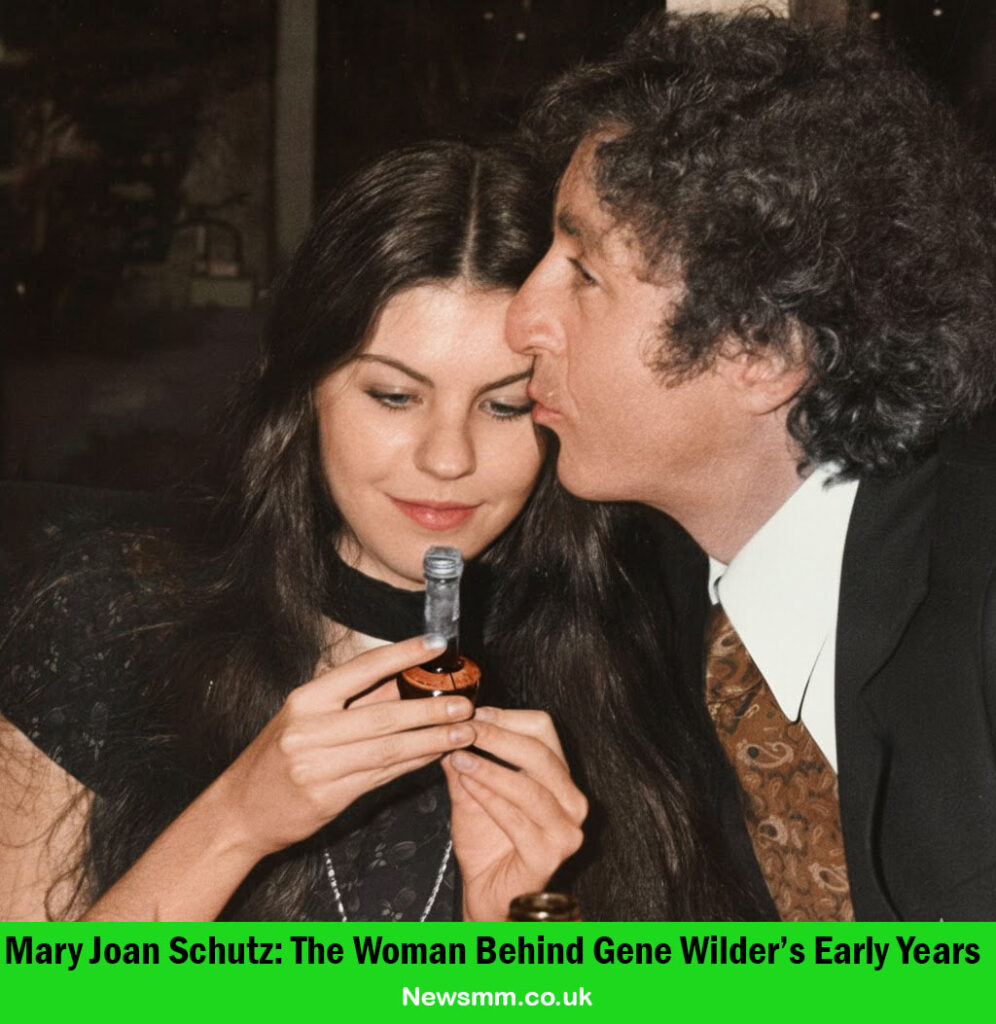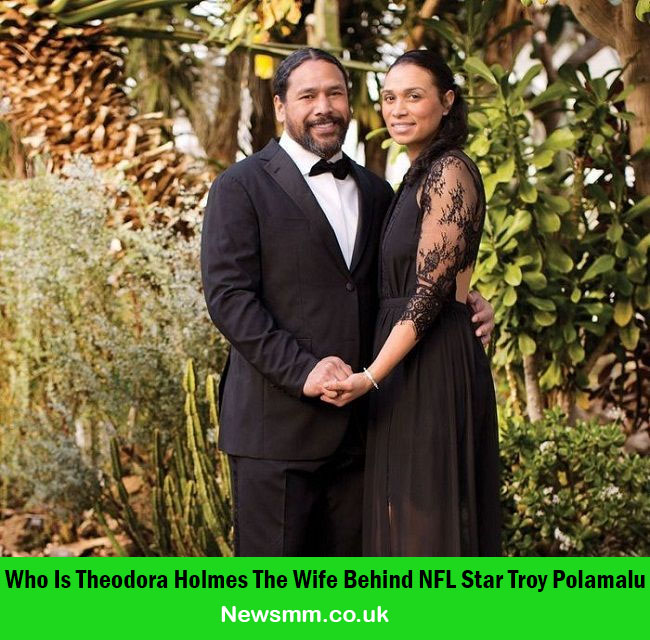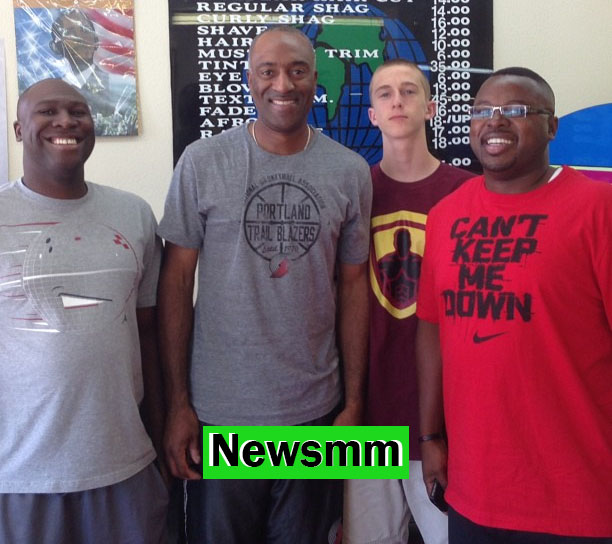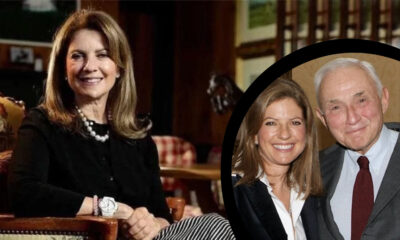Celebrity
How Dorothy Bowles Ford Shaped a Political Legacy

Dorothy Bowles Ford is best known as the mother of former U.S. Congressman Harold Ford Jr. She was married to Congressman Harold Ford Sr., who made history as the first African American member of Congress from Tennessee. While Dorothy did not seek the spotlight, her calm support helped her family take part in public life for many years. This article looks at what we can confirm about her life, her family, and her influence.
Bio
| Item | Detail |
|---|---|
| Full name | Dorothy Bowles Ford |
| Known for | Mother of Harold Ford Jr.; former spouse of Congressman Harold Ford Sr. |
| Marriage | Married Harold Ford Sr. in 1969; later divorced in 1999 |
| Children | Three sons: Harold Jr., Newton “Jake,” and Sir Isaac |
| Noted public moments | Judge for the Miss D.C. pageant (1984); hosted a “sweet tea” event in Bethesda (2008) |
| Lives | Private life; limited public details available (not widely reported by major records) |
Early life and family
There is little verified public information about Dorothy’s early years. What we do know with confidence is connected to her family. In 1969, she married Harold Eugene Ford Sr., a rising politician from Memphis. The couple had three sons: Harold Jr., Newton Jake, and Sir Isaac. They later divorced in 1999. These details are recorded in respected sources, including Wikipedia entries for Harold Sr. and Harold Jr., and documents linked to the Congressional Black Caucus Foundation, which mention Dorothy by name as the mother of Harold Jr. and the family’s three sons.
The Ford political family
The Ford family is well known in Memphis and across Tennessee. Harold Ford Sr. served in the U.S. House of Representatives from 1975 to 1997 and was the first African American to represent Tennessee in Congress. After he retired, Harold Ford Jr. won the same Memphis-based seat and served from 1997 to 2007.
Dorothy’s part in this story is quieter. She did not run for office, give many interviews, or seek fame. Still, the stable base she provided at home mattered. Many political families speak about the value of steady, caring support. In the case of the Fords, the public record shows Dorothy standing with her family at key times and keeping a low profile the rest of the time.
Public appearances and community moments
Although she kept her life private, Dorothy appeared in public on a few occasions that were covered by major newspapers:
- 1984: Dorothy served as a judge for the Miss D.C. pageant. A Washington Post lifestyle piece listed her as “wife of Rep. Harold E. Ford (D-Tenn.)” among the judges. This shows that she sometimes took part in civic and social events in Washington during her husband’s time in Congress.
- 2008: The Washington Post also reported that Dorothy hosted a ladies’ tea in Bethesda for her son Harold Jr. and his fiancée. The tone of the item was warm and showed a supportive family role.
These brief stories do not tell us everything about Dorothy, but they confirm her presence and positive role in family and community life.

A mother’s influence
When people talk about strong political families, they often point to the work done at home. Good study habits, respect for others, and a sense of duty are usually learned young. In interviews and public notes over the years, Harold Ford Jr.’s family background is clear: he grew up in Memphis in a home that valued public service and education. While the public record names Dorothy mostly as “mother of” or “wife of,” that does not make her role small. It means her influence was mainly inside the family, not in the media.
From a simple, human view, we can see a few likely ways a mother like Dorothy helped shape a legacy:
- Stability: Politics brings long hours and travel. A steady home life helps children feel safe and able to focus on school and goals.
- Values: The Ford family’s long service suggests values like community care, hard work, and persistence. Parents teach these, day by day.
- Boundaries and privacy: Dorothy chose a low profile. This likely protected her family from some public pressure and kept attention on work, not gossip.
These are general truths about many families in public life. In the Fords’ case, the outcome is clear: two generations held the Memphis seat in Congress for over 30 years combined, and this took family effort, not only campaign work.
Why her story matters
Dorothy Bowles Ford’s story matters for a simple reason: not every important person speaks from a podium. Some shape history from the kitchen table, the school run, or a quiet seat in the front row. This is not romantic talk; it is practical. Strong families help leaders do their jobs better. And when those leaders come from long marginalized groups, like Black families in the American South, that home strength is even more important.
Harold Ford Sr. broke a barrier in 1974/1975 by becoming the first African American from Tennessee to serve in Congress. Harold Ford Jr. followed him. This two generation story tells us that the Fords built trust in their community over time. Dorothy was part of that trust, even if she is not the one giving speeches.
What we do not know (and why that is okay)
Many recent websites claim details about Dorothy’s work history, such as roles at PEPCO (the Potomac Electric Power Company) or other jobs. These claims appear on newer blogs and magazine style sites, but they are not backed by major, verifiable records like established newspapers, official bios, or archival documents. Because of this, it is best to treat such job details as unconfirmed.
If stronger documentation appears later about her career, that will add to her story. For now, it is honest to say: the public record confirms the family facts and a few public moments; the rest of her life remains private.
The Ford legacy in Memphis
To understand Dorothy’s impact, it helps to see the bigger picture: the Ford family’s long service in Memphis and Tennessee’s 9th Congressional District. This district includes most of Memphis and has a strong Democratic history in modern times. Harold Sr. and Harold Jr. each served the area in Congress over three decades.
Dorothy’s steady support, along with the wider Ford family network, helped keep that legacy going. It is fair to say that without family support, long service like this is much harder.
Lessons from Dorothy’s example
Even with a small public profile, Dorothy Bowles Ford leaves a clear example:
- You can lead quietly. Influence is not only on TV or in speeches.
- Family work is real work. It makes public service possible.
- Privacy can be power. Keeping your life off the front page can protect what matters most.
- History is made by teams. Behind every public figure is a circle of helpers and often a mother who teaches the basics.
Final thoughts
Dorothy Bowles Ford shows how quiet strength can shape a public legacy. She raised three sons, supported a barrier breaking husband, and stood by a son who later served a decade in Congress. The record does not give many personal details, but it does show the power of a steady, caring presence.
Frequently asked questions (FAQs)
- Who is Dorothy Bowles Ford?
She is the mother of former U.S. Congressman Harold Ford Jr. and the former spouse of Congressman Harold Ford Sr. - When did she marry Harold Ford Sr.?
They married in 1969 and later divorced in 1999. - How many children does she have?
Three: Harold Jr., Newton “Jake,” and Sir Isaac. - Did Dorothy have a public career?
Major records do not give many details. Some sites claim roles in the energy sector, but these claims are not confirmed by top tier sources. Documented public moments include judging the Miss D.C. pageant in 1984 and hosting a 2008 tea. - Why is she called a “quiet” figure?
Because she kept a low public profile while supporting a very active political family. - What is the Ford family legacy in Tennessee?
Harold Ford Sr. was the first African American to represent Tennessee in Congress (served 1975–1997). Harold Ford Jr. then served 1997–2007. - Is Dorothy still active in public life?
She appears to live privately. There are few recent, reliable public reports about her activities. - Where did the family serve?
In and around Memphis, mainly Tennessee’s 9th Congressional District. - Are there interviews with Dorothy?
No widely known interviews in major outlets. Most coverage names her in relation to family events. - Why focus on reliable sources?
Because many web pages repeat claims without strong proof. Using established outlets like major newspapers, well sourced reference pages, and official or archival publications helps keep the story accurate.
Click for more amazing info. News MM
Celebrity
Who Is Daylen Ali Carolina? A Look at Terri J. Vaughn’s Son

Growing up with a famous parent can be hard. Some children choose the spotlight. Others choose a quiet life. Daylen Ali Carolina has chosen the second path. He is the son of actress and director Terri J. Vaughn. You may know her from The Steve Harvey Show and many movies and TV roles. Public information about Daylen is small, but it is real and trustworthy. This article gathers what reliable sources say and explains it in clear, friendly English.
Bio
| Item | Details |
|---|---|
| Full name | Daylen Ali Carolina |
| Known for | Son of actress-director Terri J. Vaughn |
| Parents | Terri J. Vaughn (mother); Derrick A. Carolina (father) |
| Year of birth | 2001 (supported by reporting that he was 7 in December 2008) |
| Half-siblings | Kal’El Joseph Riley and Lola Riley (through Terri J. Vaughn’s marriage to Karon Riley) |
| Public appearances | Seen with his mother at the BET Celebration of Gospel in Los Angeles on Dec. 10, 2008 |
| Public social media | No verified public accounts widely covered by reliable media (as of Oct 19, 2025) |
| Privacy | Keeps a low profile; limited public details are available |
Early life and family background
Daylen was born to Terri J. Vaughn and Derrick A. Carolina. Reliable profiles of Terri J. Vaughn state that she has three children: Daylen from her earlier marriage to Derrick, and two children, Kal’El and Lola, with her husband Karon Riley, a former NFL player and actor.
A notable moment in the public record came when People magazine covered a red-carpet event in 2008. The story said that 7-year-old Daylen joined his mother at the BET Celebration of Gospel in Los Angeles on December 10, 2008. This report supports the common statement that he was born in 2001.
Beyond this, Daylen’s childhood is not described much in verified media. That is normal for the child of a celebrity who keeps things private. Articles about Terri focus more on her acting work and her later family life with Karon Riley. Still, they confirm the basic facts: Daylen is her son, and he has two younger half-siblings.
A quiet public profile
Some celebrity children become influencers or actors. Daylen has not followed that road, at least not in public view. There are no major interviews with him, and no verified public social media profiles reported by reliable outlets. The main evidence of his public life is that 2008 event with his mother.
Many newer blog posts on the internet talk about Daylen. But most of them repeat the same small facts or mix in guesses. In writing this article, we rely on trusted sources that name him directly and connect him to his parents, such as People magazine coverage and biographical entries for Terri J. Vaughn.
About his mother: Terri J. Vaughn

To understand why people search for Daylen, it helps to know his mother’s career. Terri J. Vaughn is a well-known American actress, director, and producer. She won three NAACP Image Awards for The Steve Harvey Show and has worked in many films and series. Reliable bios list her personal life and confirm her children, including Daylen.
In 2025, People again mentioned Daylen when writing about the cast of the Netflix series She the People, noting that Terri has two children with Karon Riley and “is also a mother to son Daylen Ali, whom she shares with ex-husband Derrick Carolina.” This helps confirm his full name and family connections in a mainstream source.
What we can (and can’t) say with confidence
What we know from reliable sources:
- Name and parents: Daylen Ali Carolina; mother is Terri J. Vaughn; father is Derrick A. Carolina.
- Age: The People story in December 2008 called him 7, which points to a 2001 birth year; Terri’s bio also lists 2001.
- Siblings: Half-brother Kal’El Joseph Riley and half-sister Lola Riley through Terri’s marriage to Karon Riley.
- Public events: Documented appearance with his mother at the BET Celebration of Gospel on December 10, 2008.
What remains private or unconfirmed:
- School history, jobs, interests, and current city are not reported by major outlets.
- Any social media presence is not verified by reliable sources.
This lack of detail is not a problem. It simply shows that Daylen keeps his life out of the public eye, which is a valid and healthy choice.
Why people are curious
Search interest in Daylen usually comes from fans of Terri J. Vaughn who want to know more about her family. For example, when Terri appears in a new show or gives an interview, media sometimes note that she has three children and name them, including Daylen. This is a normal way that the families of well-known people appear in the news cycle.
But even when interest rises, reliable coverage still keeps private details private. That is why most of what we can say about Daylen fits in a short list of facts.
Respect for privacy
It can be tempting to look for more. However, being accurate means we should not repeat rumors or unverified claims from random sites. When writing about people who are not public figures themselves, it is best to stick to what reputable sources confirm. For Daylen, those are the People report and the established biographical entries that list Terri J. Vaughn’s children, along with a limited set of mainstream mentions.
Final thoughts
Daylen Ali Carolina is known because of his mother’s successful career. Reliable sources confirm his name, his parents, his 2001 birth year, and a few family details. Beyond that, Daylen keeps his life private. That choice deserves respect. If more verified information appears in mainstream coverage in the future, this picture may grow. For now, the honest story is simple and clear, and that is okay.
Frequently asked questions (FAQ)
- Who is Daylen Ali Carolina?
He is the son of actress and director Terri J. Vaughn and her former husband, Derrick A. Carolina. - When was he born?
Evidence shows he was born in 2001. In December 2008, People reported he was 7 years old. - Who are his siblings?
He has two younger half-siblings: Kal’El Joseph Riley and Lola Riley, from his mother’s marriage to Karon Riley. - Is Daylen in show business?
There is no reliable report that he works in acting or music. Public sources do not describe his career. - Has he been seen at public events?
Yes. People covered his red-carpet appearance with his mom at the BET Celebration of Gospel on Dec. 10, 2008. - Is he on social media?
No major outlet has verified a public account for him. Because of that, we cannot confirm any profiles. - Why do some websites say different things about him?
Many smaller sites repeat each other or guess details. This article uses reliable sources and avoids unconfirmed claims. - What does his father do?
His father is Derrick A. Carolina. Some sources describe him as a composer, but mainstream outlets mainly confirm his name and marriage history with Terri J. Vaughn. - Where does Daylen live now?
This is not reported by trusted media, which suggests he values his privacy. - Why is Daylen mentioned in the news sometimes?
When articles profile Terri J. Vaughn, they often list her children. That is why his name appears in respected outlets from time to time.
Click for more amazing info. News MM
Celebrity
Mary Joan Schutz: The Woman Behind Gene Wilder’s Early Years

Mary Joan Schutz is best known as Gene Wilder’s second wife. She did not work in films or seek fame. Still, her life connects with a key time in Wilder’s career, when he moved from a rising actor to a star. Because she stayed private, there is not much public data about her early life or work. What we do know comes from trusted information about Wilder’s life and from Wilder’s own timeline. This article brings those facts together in clear, simple English.
Bio
| Item | Detail |
|---|---|
| Full name | Mary Joan Schutz |
| Known for | Second wife of actor Gene Wilder |
| Relationship period | Married October 27, 1967 – divorced 1974 (about seven years) |
| Children | One daughter, Katharine; Gene Wilder adopted her in 1967 |
| Public career | Largely private; not a public figure |
| Notable context | Marriage took place during Wilder’s early, important film years (late 1960s to mid-1970s) |
How Mary met Gene Wilder
After Gene Wilder divorced his first wife, Mary Mercier, he began dating Mary Joan Schutz. Several sources say she was a friend of his sister, and that is how they met. At that time, Schutz already had a young daughter, Katharine, from a previous relationship. This family connection soon became important to both of them.
When Katharine began to call Gene “Dad,” Wilder felt it was the right thing to make the bond official. He and Mary married on October 27, 1967, and he adopted Katharine in the same year. These are the most solid dates we have for Mary’s life in public record.
A quiet partner during big career steps
Mary’s years with Gene match a major run of films for him. In 1967, the year they married, The Producers made Wilder known to a wide audience. In 1971, he played Willy Wonka in Willy Wonka & the Chocolate Factory, a role that later became iconic. In 1974, he appeared in Blazing Saddles and Young Frankenstein. These titles still define Wilder to many people. During much of this time, Mary was his spouse, keeping a private life while he worked in the public eye.
It is fair to say that Mary lived with the pressures that come when a partner becomes famous. Sets, travel, long hours, and media attention can stress any marriage. We do not have many interviews or quotes from Mary. We only see the outline through Wilder’s known timeline and reliable biographies.
About their daughter, Katharine
Mary’s daughter, Katharine, became Wilder’s only child through adoption in 1967. Reports note that Katharine later grew distant from Wilder. Many accounts link the break to rumors of an affair during the time of Young Frankenstein. Wilder denied an affair with his co-star Madeline Kahn, but the belief still hurt the family. The important point for Mary’s story is that this private pain affected mother and daughter as well.
Later articles and obituaries about Wilder often mention that he and Katharine remained estranged for many years. These summaries do not give details about Mary’s own later life, which remains outside the public record.
Marriage and separation
The marriage lasted about seven years and ended in 1974. The reasons are private, though some reports say that strain and rumors during a very busy film period played a role. Again, Wilder said there was no affair with Kahn. What we can state clearly is the timeline: married in 1967 and divorced in 1974.
After the divorce, Wilder dated for a time and later married Gilda Radner in 1984. That later love story is well known. Mary, in contrast, did not seek the spotlight. Public records do not show interviews by Mary after the divorce. This is why reliable information about her beyond the marriage is limited.
Why information about Mary is limited
Many websites repeat claims about Mary that are not supported by strong sources. Some even give a place of birth or parents’ names with no clear proof. Because this article uses reliable information, we avoid unconfirmed details. The facts we can stand on are:
- She met Wilder after his first divorce and through his sister.
- They married on October 27, 1967.
- Wilder adopted her daughter, Katharine, in 1967.
- They separated and divorced after about seven years, in 1974.
These points come from trusted and well-known public records about Gene Wilder’s life and marriages.

Mary’s place in Wilder’s larger story
When people tell the story of Gene Wilder, they often focus on his films and on his later marriage to Gilda Radner. But Mary’s part came earlier, during the building years. She shared daily life with him while he moved from stage and small roles to global fame. She raised a young daughter while Wilder traveled and worked. The adoption shows Wilder’s choice to become a father and to take family duties seriously at that time. Even though the marriage did not last, it shaped Wilder’s early home life.
The human side: love, change, and privacy
It is easy to read famous lives as a list of films and dates. Mary’s story reminds us that real people live behind those lists. Two adults met, cared for a child, married, and tried to build a home. Fame and work made life busy, and later the marriage ended. That is common in Hollywood, but it still brings real feelings and effects.
Mary chose privacy. She did not give long interviews or push her own public profile. Today, most of what we can say about her is linked to her role as a partner and a mother during a very bright period in Wilder’s career. That choice to stay quiet also deserves respect.
What reliable sources say (and do not say)
- Confirmed: Marriage date (October 27, 1967), adoption of Katharine in 1967, separation and divorce after about seven years, and the broad context of rumors and strain.
- Confirmed: The key films and their release years that mark Wilder’s rise while Mary was his spouse.
- Not confirmed by strong proof: Exact birth year, birthplace, parents’ names, or later residence for Mary. Many recent posts online claim these details without clear backups. For accuracy, we leave them out.
This careful line helps readers trust the article and keeps the focus on what is real and supported.
Lessons from Mary Joan Schutz’s story
- Private people can stand at the edge of public history. Mary’s life touched world famous films, yet she stayed outside the camera’s view.
- Family choices matter. Adoption is a deep promise. It shaped Wilder’s life and Mary’s family path.
- Rumors have power. Even when denied, they can hurt trust and family ties. The reported rift with Katharine shows that impact.
- Accuracy is kindness. With limited facts, it is best to share only what we can confirm and respect a private person’s choice to stay quiet.
Conclusion
Mary Joan Schutz stands in the background of a very bright stage. She came into Gene Wilder’s life just as his career took off. She cared for her daughter, formed a family with Wilder, and stayed private while he became famous. The public record gives only key dates and events, but even this small window shows love, change, and the cost of life in the spotlight.
Frequently asked questions (FAQ)
- Who is Mary Joan Schutz?
She is Gene Wilder’s second wife. They married in 1967 and divorced in 1974. She kept a private life and did not work as a public figure. - How did Mary and Gene meet?
She was a friend of Gene’s sister, which led to their relationship. - Did Gene Wilder have a child with Mary?
Gene adopted Mary’s daughter, Katharine, in 1967. She was his only child. - Why did Mary and Gene divorce?
The exact private reasons are not fully recorded. Reports mention strain and rumors during a busy film period. Wilder denied an affair with co-star Madeline Kahn. The marriage ended after about seven years. - Was Mary involved in Hollywood?
There is no strong record that she worked in film or sought fame. She kept a low profile. - What films did Gene make while married to Mary?
Key titles from that era include The Producers (1967), Willy Wonka & the Chocolate Factory (1971), Blazing Saddles (1974), and Young Frankenstein (1974). - What happened to Katharine after the divorce?
Reports say she became estranged from Wilder for many years. This is often linked to the period’s rumors. - Is there a book that mentions this part of Wilder’s life?
Yes. Wilder’s memoir Kiss Me Like a Stranger reflects on his personal life and relationships, though it is not focused on Mary alone. - Are there verified details about Mary’s birth or parents?
Strong proof does not confirm those details. Many recent posts online list them without clear support. For accuracy, it is better not to repeat them. - Where is Mary today?
There is no verified public information. She has chosen a private life, and reliable outlets do not report on her current location.
Click for more amazing info. News MM
Celebrity
Shelly Tresvant: The Woman Behind Ralph Tresvant’s First Chapter

When people talk about New Edition, they often speak about the music, the tours, and the fans. They also speak about Ralph Tresvant, the group’s smooth lead singer. Less is known about Shelly Tresvant, the woman who shared Ralph’s early adult years and became his first wife. Shelly is not a public figure. She does not give interviews, and she keeps her family life away from the spotlight. Still, her story matters, because it shows the human side of fame: love, family, change, and privacy.
Bio
| Field | Details |
|---|---|
| Full name | Shelly Tresvant |
| Known for | First wife of R&B singer Ralph Tresvant (lead singer of New Edition) |
| Marriage | Married 1993, divorced 1996 |
| Children | Three with Ralph: Na’Quelle, Mariah, Ralph Jr. |
| Present life | Lives a low-profile, private life; not active in public media |
| Related figures | Ralph Tresvant (New Edition), later married Amber Serrano in 2004 (for context) |
Early years and private nature
Public records about Shelly’s childhood are scarce. Most mainstream music biographies focus on Ralph’s career and the rise of New Edition, not on the partners who stood beside the band members. What we do know is that Shelly met Ralph when they were young, long before his solo hits and award shows. Many sources describe them as childhood or longtime sweethearts who later married as adults. Because Shelly has chosen a quiet life, exact details about her school years, work, or family background are not widely available. This lack of detail is not unusual for a private person connected to a famous artist.
Marriage to Ralph Tresvant
Most sources agree on a clear timeline: Shelly and Ralph married in 1993. Their marriage did not last long; they divorced in 1996. During those years, Ralph was already a well-known singer and a key voice of New Edition, and he was also active as a solo artist. Fame brings pressure, and life on the road is hard on any relationship. While we should avoid gossip, it is fair to say the couple faced challenges that many young families face, only under the public eye.
Why these dates matter
1993 was after Ralph’s solo breakthrough (1990) and during New Edition’s continuing success.
1996 was the year New Edition released the reunion album Home Again, a busy time for the group.
This context helps us understand how busy and stressful those years were for the Tresvant family.
Children and family
Shelly and Ralph have three children together: Na’Quelle, Mariah, and Ralph Jr. This is one of the best-confirmed facts about Shelly’s life. Over time, their children have appeared in posts and mentions connected to Ralph’s family, and media summaries of his life also list their names. Their oldest, Na’Quelle, followed a creative path and has shared music with the public. Today, all three children are adults with their own lives.
Shelly’s choice to live privately likely helped the children grow away from constant attention. While fans have a natural interest in the family of a famous singer, Shelly’s steady privacy set a simple rule: family first, publicity second. That approach is common among partners of well-known artists who prefer a normal life for their kids.

Life after the divorce
After the divorce in 1996, Shelly stayed out of the public eye. She did not build a media brand, and she did not appear in reality shows or celebrity news on a regular basis. Some outlets mention that she lives quietly in Atlanta and avoids social media. These are not dramatic facts, but they are important: they show a person who values peace over attention. At the same time, Ralph later married Amber Serrano in 2004, which is widely documented in mainstream outlets that cover New Edition and Black celebrity culture. This gives a sense of the broader family timeline without pulling Shelly into gossip.
What we can say with confidence (and what we should avoid)
Because Shelly is a private person, it is good practice to separate confirmed facts from rumors:
- Confirmed or well-reported facts
- First wife of Ralph Tresvant
- Married 1993; divorced 1996
- Three children with Ralph: Na’Quelle, Mariah, Ralph Jr.
- Chose a low-profile life after the marriage
- Rumors or unverified details
- Personal struggles reported by gossip sites without strong sourcing
- Exact birth date or hometown when stated without clear documents
When writing about any private person, we should not repeat unproven claims. Doing so is unfair and can harm real people. In Shelly’s case, many pages on the internet simply repeat each other. This article uses sources that are transparent about what is known and avoids sensational language.
Shelly’s place in the New Edition story
To understand Shelly’s role, we need a short look at Ralph’s career:
New Edition became a leading R&B group in the 1980s, with hits like “Cool It Now.”
Ralph’s solo album (1990) was a major success and helped him become a household name.
The group had a major reunion in 1996 with Home Again, which brought fresh attention and a busy schedule.
Shelly’s marriage to Ralph fits right in the middle of this timeline. She was there during a period of heavy travel, recording, and press. It is not easy to raise a family under that kind of pressure. Shelly’s decision to keep a low profile helped protect her children from the noise of fame.
Parenting and legacy
While Shelly does not speak in public, the best sign of her life’s work is simple: three adult children who grew up with two parents known around the music world. Na’Quelle has shared her creative work, and Ralph Jr. and Mariah are known to fans mostly through family mentions and old photos. The family has also grown to include grandchildren, which sometimes appears in fan discussions and light media pieces. Even here, Shelly stays off camera. That is a choice many readers can respect in the social-media era.
Respecting privacy while sharing history
Writing about Shelly means walking a careful line. On one side, there is public interest in New Edition and the personal stories around the group. On the other, we must respect the clear choice of a private person who did not ask for fame. The best way to do this is to stick to basic facts, keep the tone friendly, and leave space for the parts of life that belong only to family.
Shelly’s story also reminds us that not every important person is a public figure. Many partners and spouses support artists during the early years. They help with normal life while the artist handles a very abnormal schedule. That support rarely makes headlines, but it matters.
Closing thoughts
Shelly Tresvant’s story is not about headlines. It is about family, privacy, and dignity during years when her partner’s music reached the world. We may not know every detail of her life, and that is fine. What we do know is clear and simple: she was part of Ralph’s first chapter, a chapter that included young love, marriage, and the birth of three children who are now grown. In an age of constant sharing, Shelly’s choice to step back shows a different kind of strength, the strength to live quietly and protect what matters most.
Frequently asked questions (FAQ)
- Who is Shelly Tresvant?
Shelly Jean Tresvant is the first wife of singer Ralph Tresvant from New Edition. She is a private person who stays out of the spotlight. - When did Shelly and Ralph get married?
They married in 1993. - When did they divorce?
They divorced in 1996. - How many children do they have?
They have three children: Na’Quelle, Mariah, and Ralph Jr. - Is Shelly active on social media?
No public, verified accounts are widely known; she keeps a low profile. - Where does Shelly live now?
Reports say she lives a quiet life, but no official public profile confirms a precise city. - Did Shelly work in the music business?
There is no verified public record that she worked in the industry; most coverage focuses on her private life and role as a mother. - Why is there so little information about her?
Shelly is not a public figure and chooses privacy, so reliable outlets share only basic facts. - What happened to Ralph after the divorce?
For context, Ralph later married Amber Serrano in 2004, and continued his music and media work. - Is it okay to repeat rumors about Shelly?
No. Since many claims online lack strong sources, it is best to avoid rumors and stick to confirmed facts to respect her privacy.
Click for more amazing info. News MM
Celebrity
Bryan Spies: How He Supports His Wife Abigail Hawk and Their Family

Being married to a TV star can be hard. Cameras follow, stories spread, and rumors grow. Yet some partners choose a quiet path. Bryan Spies is one of them. He is the husband of actress Abigail Hawk, who many people know as Detective Abigail Baker on Blue Bloods. Bryan prefers life away from the spotlight. Still, we can learn some true and respectful facts about him from trusted sources. This article shares those facts in clear, easy English.
Bio
| Item | Details |
|---|---|
| Full name | Bryan Spies |
| Known for | Husband of actress Abigail Hawk (Blue Bloods) |
| Job | FDNY professional (reported as a lieutenant) |
| Spouse | Abigail Hawk (married 2009) |
| Children | Two sons (names private) |
| Public style | Private, low-key; supports family and wife’s career |
| Seen together | Occasional red-carpet events (e.g., Broadway opening night in 2024/2025) |
Who is Bryan Spies?
Bryan Spies is best known to the public as the husband of actress Abigail Hawk. Abigail played Detective Abigail Baker on Blue Bloods for 14 seasons. Public reports say Bryan works for the Fire Department of the City of New York (FDNY). He is described as an FDNY lieutenant and it is known that he and Abigail married in 2009 and have two sons.
IMDb also lists the marriage date as April 25, 2009. This helps confirm the year and the long length of their relationship.
Wikipedia’s page on Abigail Hawk says she is married to Bryan Spies, a paramedic with the FDNY, and that they have two sons. While titles can differ across write-ups, all agree that Bryan serves with FDNY and that the couple have two children.
Because Bryan stays private, there are not many first-hand interviews about him. Still, we can trust basic facts that come from reliable and verified sources.
A short timeline
- Before 2009: Bryan and Abigail date quietly. Public details from this time are limited, which fits their private style.
- April 25, 2009: Marriage. IMDb lists this exact date; PEOPLE confirms the year.
- 2010–2024: Abigail appears on Blue Bloods. After the show ended in 2024, she shared that she valued extra time with family. This highlights the importance of home life for the couple.
- Public sightings: The two sometimes attend events together, such as the Broadway opening night of The Great Gatsby.
His work and why it matters
Working for FDNY is serious and demanding. Reports describe Bryan as an FDNY lieutenant, a role that carries leadership in emergency response. This type of job needs calm under stress, teamwork, and care for people. It also means long hours and shifts. Supporting a family while doing this work is not easy. Yet, from the way Abigail speaks about family time and balance, it is clear their home is a strong base.
Some articles call him a paramedic or EMT. Others say lieutenant. Why the difference? Public profiles of private people often repeat old information. Jobs and titles can also change over time. What stays the same is the FDNY service and the focus on family. For the most up-to-date public reference, he is called an FDNY lieutenant.
Marriage to Abigail Hawk

Abigail Hawk is an award-winning actress. She has shared pieces of her life in interviews, but she protects her family’s privacy. It is confirmed she is married to Bryan Spies and that they have two sons. She has spoken about family time, especially after Blue Bloods ended. She appreciated having a summer with family once filming stopped. This shows how important home is to both of them.
IMDb lists their wedding date as April 25, 2009. That means they have been together for well over a decade. Many fans find that inspiring, because long marriages in entertainment are not common in headlines.
A private life by choice
Not every family member of a celebrity wants public attention. Bryan seems to choose a quiet path. This is healthy and wise, especially with children. You can still see their bond at a few events, like Broadway openings, but most of the time they live outside the news. Photos from BroadwayWorld show them together at red-carpet events, but there are not many interviews or talk-show stories featuring Bryan.
This limited public profile is not a lack of love or support. It is a sign of boundaries. It lets the couple raise their boys with more normal days and fewer headlines.
How Bryan supports Abigail and their family
Support can be loud or quiet. Bryan’s support looks quiet, steady, and daily. Based on what we can read:
- Showing up when it matters
He joins Abigail at select events. This is a public way to say, “We are a team,” without giving up privacy. - Stable home base
After Blue Bloods finished in 2024, Abigail valued more time with family. That suggests that home life with Bryan at the center helped her move through a big career change. - Strong example for their children
FDNY service models courage and care for the community. Combining that with Abigail’s discipline as an actress gives their sons two powerful role models. - Protecting privacy
Keeping family details private is also support. It gives the children space to grow without pressure.
Respecting facts vs. rumors
A lot of websites repeat the same lines about Bryan. Some are careful; some are not. To keep things true, it is best to rely on trusted outlets like PEOPLE, IMDb, Wikipedia, and verified event pages. When you see claims without sources or with only gossip sites behind them, be careful. Look for named outlets and original reporting. In Bryan’s case, fewer facts are public, so we should not guess.
What we can learn from Bryan Spies
- Service matters. Working for FDNY is a calling. It shows bravery and care for others.
- Privacy is a strength. Not sharing everything can protect love and family life.
- Partnership is balance. Abigail’s career had busy periods. Bryan’s steady presence and his own demanding work required teamwork and good planning.
- Family first. After Blue Bloods ended, Abigail spoke about how much she enjoyed time with family. That message is simple and true for many people.
Final thoughts
Bryan Spies is not a celebrity by trade. He serves the city with FDNY and supports his family with quiet strength. He and Abigail Hawk have built a life based on service, work ethic, and privacy. We do not need a long list of personal details to respect that. What we know from verified public information shows a partner who stands beside his wife, not in front of her, and a father who keeps his children out of the public eye. That is a strong story on its own.
Frequently Asked Questions (FAQs)
- Who is Bryan Spies?
He is the husband of actress Abigail Hawk and works with the FDNY. - Is Bryan Spies a firefighter or a paramedic?
Reports differ. Some call him an FDNY lieutenant. Others say paramedic/EMT. All agree he serves with the FDNY. - When did Bryan Spies and Abigail Hawk get married?
They married on April 25, 2009. - Do they have children?
Yes, two sons. Their names are private. - Does Bryan Spies appear on TV or give interviews?
No, not often. He keeps a low profile, though he sometimes joins Abigail at events. - Why is there little information about him online?
Because he chooses privacy. Also, many websites copy the same lines. It is best to follow trusted outlets. - What does Abigail Hawk say about family life?
She has said that finishing Blue Bloods allowed her more time with family, which she valued a lot. - Are there photos of them together?
Yes. For example, they have appeared together at Broadway events. - Where do they live?
The exact home is not public. Reports focus on Bryan’s work with FDNY and their New York ties. - Is Bryan active on social media?
There is no confirmed public account. The couple keeps family life private.
Click for more amazing info. News MM
Celebrity
Meet Molly Leigh Burton: The Daughter of Rock Star Dolores O’Riordan

Molly Leigh Burton is the daughter of the late Dolores O’Riordan, the world famous singer of The Cranberries, and Don Burton, a Canadian music executive who worked with Duran Duran. Even with her family’s fame, Molly has kept a low profile. Public information about her is limited and comes mainly from news reports and family profiles written at the time of her mother’s passing. This article gathers what is publicly known and presents it in clear, simple language.
Bio
| Fact | Detail |
|---|---|
| Full name | Molly Leigh Burton |
| Born | 27 January 2001 (reported) |
| Parents | Dolores O’Riordan (singer, The Cranberries) and Don Burton (music executive, ex Duran Duran tour manager) |
| Siblings | Older brother Taylor Baxter Burton and younger sister Dakota Rain Burton |
| Nationality | Irish (grew up between Ireland and Canada) |
| Known for | Being the middle child of Dolores O’Riordan |
| Family life | Private; family moved to Canada in 2009; parents separated in 2014 |
| Notable family events | Dolores O’Riordan passed away in 2018 |
Family background
Dolores O’Riordan was born in County Limerick, Ireland, and became one of the most recognized voices in rock in the 1990s with hits like “Linger” and “Zombie.” She married Don Burton in July 1994. Don was the tour manager for Duran Duran, and later worked on music projects with Dolores. Together they had three children Taylor, Molly, and Dakota.
Irish and international newspapers that covered Dolores’s life and death in January 2018 wrote that she was survived by her three children Taylor Baxter, Molly Leigh, and Dakota Rain. These reports confirm the children’s names and family ties.
Early life
News and biography pages report that Molly was born on 27 January 2001. While many outlets repeat this date, exact birth details for family members are usually reported only when the family shares them or when they appear in public records. Entertainment news roundups published in 2018 also mention that Dolores and Don welcomed Molly on 27 January 2001. A feature based on an earlier interview adds useful context: at the time of that interview, Dolores was “almost 30” and a “new mom to 4 month old Molly,” which matches an early 2001 birth window. Taken together, these sources support the commonly cited date.
Molly spent her early years in Ireland, where the family lived in counties Limerick and Dublin for long periods. Dolores and Don also kept strong ties with Canada. In 2009, the family moved full time to Buckhorn, Ontario, a quiet lakeside area near Peterborough. Reports from Irish and Canadian outlets, as well as retrospective features, describe how life in Canada gave Dolores and the children a calmer daily rhythm away from the spotlight.
Parents and siblings
- Mother: Dolores O’Riordan (1971–2018)
Lead singer of The Cranberries, a major voice in 1990s rock. She balanced world tours with family life and often spoke about how important her children were to her. - Father: Don Burton
A Canadian music professional known for his work as Duran Duran’s tour manager and for later roles around The Cranberries. He and Dolores married in 1994 and later separated in 2014. - Siblings:
Taylor Baxter Burton (older brother) and Dakota Rain Burton (younger sister). Press reports list the three children by name when speaking about Dolores’s family.
After the separation in 2014, several reports said the children were living in Canada with their father, while Dolores returned to Ireland for work and personal reasons. This detail helps explain why Molly has kept a private life, away from music media and daily press.
Growing up in a music family

Being the child of a famous artist can be exciting but also challenging. Interviews and features about Dolores often describe her as a caring mother who looked for balance between work and home life. Moving to Canada helped the family enjoy nature, school, and a more regular routine. Dolores herself said she liked being treated “like any ordinary person” there, and she even volunteered at her children’s school for a time. These details give a real picture of the family environment in which Molly grew up.
Life in the Canadian countryside also gave the family more space and privacy. Dolores found peace near the lakes, and she often spoke about how much she enjoyed the seasons and quiet surroundings. This slower pace likely shaped Molly’s teen years.
Personal life and privacy
There is no public record that Molly has pursued a career in music or has given formal interviews. She has not sought the spotlight, and most media mentions come only when journalists write about Dolores O’Riordan. For this reason, reliable information about Molly focuses on family facts her parents, siblings, and where the family lived not on personal hobbies or daily life. The responsible thing for writers and readers is to respect that privacy and to rely on credible sources rather than rumors.
Loss and legacy
Dolores O’Riordan died on 15 January 2018 in London at the age of 46. Obituaries and tributes around the world noted her influence and also mentioned her children by name, including Molly. The family received many public messages of support. One Irish news report in 2018 covered a donation made to Dolores’s children by another band as a tribute, which shows how strongly the music community cared for them.
For Molly, her mother’s legacy is both personal and public. On the public side, Dolores’s music continues to reach new listeners. On the personal side, Molly and her siblings have kept a quiet life while the world remembers their mother’s voice and songs.
What we can say with confidence (and what we should not)
When writing about a private person like Molly, it is important to mark clearly what is confirmed and what is not known:
- Confirmed, well sourced facts:
Her parents’ identities and careers; her siblings’ names; the family’s move to Canada in 2009; her parents’ separation in 2014; and her mother’s death in 2018. - Commonly reported, but not officially detailed by the family:
Molly’s birth date is widely reported as 27 January 2001 in entertainment reports and biography sites. A feature about a “lost interview” supports an early 2001 birth window by stating Molly was four months old at the time of that conversation. These sources are reasonable, but readers should know the difference between press reports and official family statements. - Unknown or private:
School details, personal interests, social media, and current location are not public in reliable sources. This article does not speculate.
Why Molly’s story matters
Molly’s story shows the human side of a music legend’s family. Fans know the songs, the tours, and the awards. But behind the stage, there is a mother who cared for her children and tried to give them a normal home. The move to Canada in 2009, the time away from busy cities, and the choice to keep the children out of the spotlight all point to a family that valued privacy and balance.
For readers, this is a reminder that the children of celebrities are people first. They deserve space to grow and choose their own path, whether in music, another art, or a completely different field.
Final thoughts
Molly Leigh Burton did not choose fame, but she was born into a music family that touched millions of listeners. The confirmed facts about her life are simple who her parents are, who her siblings are, and where the family lived. Beyond that, privacy is the rule. For readers and fans of The Cranberries, the best way to honor Molly and her siblings is to enjoy the music and respect the family’s space.
Frequently asked questions (FAQs)
- Who is Molly Leigh Burton?
She is the daughter of singer Dolores O’Riordan (The Cranberries) and music professional Don Burton. - When was Molly born?
Many reports say 27 January 2001. This date appears in entertainment news and biography listings and fits the timeline from a feature noting she was four months old in a 2001 interview window. - Where did Molly grow up?
In Ireland and later Canada. The family moved full time to Buckhorn, Ontario in 2009. - Who are Molly’s siblings?
Taylor Baxter (older brother) and Dakota Rain (younger sister). - What does her father, Don Burton, do?
He worked in music and was Duran Duran’s tour manager. - Did Dolores and Don stay together?
They separated in 2014 after about 20 years of marriage. - Is Molly a musician like her mother?
There is no reliable public information that she has released music or works in the music industry. - Why is there so little information about Molly?
Because she keeps a private life, and most reporting focuses on her mother’s career and legacy. - How is Molly mentioned in coverage of Dolores’s death?
Obituaries and tributes list the children by name Taylor, Molly, and Dakota and express sympathy to the family. - Where can I read more about the family from reliable sources?
Good starting points are The Irish Times obituary and features, The Guardian obituary, and profiles in Rolling Stone.
Click for more amazing info. News MM
Celebrity
Antonio Chi Su: The Man Behind Lyn May’s Quiet Strength

This story is about Antonio Chi Su, a quiet businessman who became known to many people because he married Lyn May, the famous Mexican vedette and actress. He did not want the spotlight. He worked, he built a business, and he supported his wife. His life shows love, work, culture, and also pain. In this article, you will learn who he was, what he did, how he and Lyn May built a life together, and how people remember him today. Where facts are public and confirmed, I point to sources so you can check them. Some details of his early life are not public; when that happens, I say it clearly.
Bio
| Item | Detail |
|---|---|
| Full name | Antonio Chi Su (also written Antonio Chi-Xuo in some media) |
| Known for | Husband of Mexican vedette Lyn May; co-owner of a Chinese restaurant on Avenida Bucareli, Mexico City |
| National/cultural background | Described as Chinese-Mexican in public reporting |
| Marriage | Late 1980s (often listed as 1988 or 1989) |
| Work | Businessman / restaurateur (local, family-style focus) |
| Illness | Prostate cancer (diagnosed 2004) |
| Death | 2008 |
| Notable media note | Lyn May later spoke about exhuming his remains during deep grief; widely reported |
Who was Antonio Chi Su?
Most public records describe Antonio as a Chinese-Mexican businessman. He is best known for his marriage to Lyn May, and for working with her to open a Chinese restaurant on Avenida Bucareli in Mexico City. This is one of the clearest, repeated facts across reliable sources.
You will sometimes see his name written as “Antonio Chi-Xuo” in Spanish-language media. This is the same person. News reports and interviews use both spellings.
A note on years (to be exact)
Different outlets give 1988 or 1989 for the wedding year. Wikipedia lists 1989 in the infobox; other summaries and timelines say 1988. Because both dates appear in trustworthy summaries, it is safest to say they married in the late 1980s (commonly reported as 1988 or 1989).
How did their life together look?
Building a home and a business
After marrying, Antonio and Lyn opened a Chinese restaurant on Avenida Bucareli. Bucareli is a central avenue with many offices and classic buildings, so a good place for a steady, local restaurant. Reports identify this restaurant as part of their shared life and work. People remember it as a small cultural link between Chinese and Mexican communities in the city.
Private by choice
Unlike Lyn May, Antonio did not do TV, film, or shows. He stayed out of the media. Because of this, his early life, family background, and private details are not widely published. Reliable sources simply do not give more. This is important: we should not guess. We can only share what public records and interviews say.
Health, loss, and grief
In 2004, Antonio was diagnosed with prostate cancer. He died in 2008. These dates are consistent in the best sources we have.
After his death, Lyn May spoke in interviews about her deep grief. In a TV interview later covered by Newsweek, she said she exhumed (dug up) her husband’s remains for a time because she could not accept the loss. It is a sad part of this story, but it shows how strong their bond was for her. Spanish-language entertainment media and Univision also reported these statements.

What we know vs. what we do not know
Confirmed public facts
- Marriage: Late 1980s (often listed as 1988 or 1989)
- Business: Opened a Chinese restaurant on Avenida Bucareli in Mexico City
- Illness: Prostate cancer diagnosed 2004
- Death: 2008
- Public grief account (by Lyn May): She said she exhumed his body during deep mourning
Not publicly documented
- Exact birth date, birth place, early schooling, detailed family tree, and full career history before marriage do not appear in reliable, verifiable sources online. If you see exact numbers or lists for these, check carefully—they are often guesses or copied from blogs.
Why Antonio matters in Lyn May’s story
Many fans know Lyn May for her stage work and films. But her home life and business life with Antonio offers a different picture: stability, teamwork, and culture. Their restaurant was a place where everyday people could meet the star in a normal setting, share food, and talk. This is a simple, human thing but it built connection.
Media, myths, and name spellings
If you search in Spanish, you will find “Antonio Chi-Xuo” as well as “Antonio Chi Su.” The “Xuo” version appears in several entertainment reports and in social posts that repeat interview quotes; English-language reporting and Wikipedia commonly use Chi Su. The mixed spellings are typical when Chinese-origin names pass through Spanish media and older TV captions. Both point to the same person: Lyn May’s husband who died in 2008.
Timeline
- Late 1980s Marriage to Lyn May (reported as 1988 or 1989)
- Late 1980s–1990s The couple run a Chinese restaurant on Av. Bucareli in Mexico City
- 2004 Prostate cancer diagnosis
- 2008 Death of Antonio Chi Su
- After 2008 Lyn May publicly shares her intense grief in interviews; coverage follows in international media
Character and legacy
From the public record, Antonio seems like a quiet, steady partner. He helped manage the everyday work that comes with a restaurant: buying, staffing, serving, fixing problems. This is not glamorous work, but it is important. It helped give Lyn May a base outside the show world.
His legacy is not a big company or a famous invention. It is memory: a good husband, a small business that welcomed many people, and a cross-cultural home where Chinese and Mexican food and family life mixed. When people remember the hardest part of Lyn May’s story the grief they also remember why the grief was so strong the love and years they shared.
Final thoughts
Antonio Chi Su’s life reminds us that not every important person is in the headlines. He stood beside a star, helped run a small but meaningful business, and lived a simple, steady life. The facts we have are few, but they are clear: a late-1980s marriage, a shared restaurant, a long illness, and a death that left deep pain. This is a human story more than a celebrity story. And it is enough to honor him with truth, not guesses.
Frequently Asked Questions (FAQ)
- Who was Antonio Chi Su?
He was a Chinese-Mexican businessman and the husband of Mexican actress and vedette Lyn May. He kept a low profile and worked mainly in the restaurant they ran together. - Is “Antonio Chi-Xuo” the same person?
Yes. Some Spanish-language reports use Chi-Xuo; English reports and Wikipedia use Chi Su. They refer to the same person. - When did he and Lyn May get married?
Sources differ between 1988 and 1989. It is safe to say late 1980s. - What business did they have together?
They ran a Chinese restaurant on Avenida Bucareli in Mexico City. - How did Antonio Chi Su die?
He died in 2008 after being diagnosed with prostate cancer in 2004. - Why do people talk about his story today?
Because Lyn May later spoke about her extreme grief after his death, which media covered widely. This brought attention back to their marriage and to Antonio’s life. - Do we know his exact birth date or early life details?
No reliable public source gives his exact birth date or full early biography. Good sources are careful and do not invent this data. - Was he famous in his own right?
He was not a public entertainer. He was known in business and as Lyn May’s husband. His fame comes from their life together and their restaurant. - What is the best way to verify facts about him?
Check Wikipedia’s page for Lyn May for the marriage, restaurant, illness, and death timeline, and Newsweek or Univision for reports on Lyn’s public statements about her grief. - How is his legacy seen today?
As a quiet legacy: a supportive partner, hard work in a family restaurant, and a strong bond that Lyn May spoke about many years later.
Click for more amazing info. News MM
Celebrity
Who Is Elizabeth Bowes Gregory? The Quiet Daughter of Martha MacCallum

Many people know Martha MacCallum from Fox News. But less is known about her daughter, Elizabeth Bowes Gregory. Elizabeth does not seek the spotlight. She keeps a quiet, normal life. Still, people are curious. Who is she? What did she study? What kind of career path has she chosen?
Bio
| Item | Details |
|---|---|
| Full name | Elizabeth Bowes Gregory |
| Known for | Daughter of Fox News anchor Martha MacCallum and businessman Daniel John Gregory |
| Family | Two brothers: Edward Reed Gregory and Harry MacCallum Gregory |
| Education | Villanova University, B.A. in Political Science (cum laude, reported) |
| High school | Oak Knoll School of the Holy Child, Summit, New Jersey |
| Early interests | Politics, media, global affairs (minors reported: Arab & Islamic Studies, Communication, Criminology) |
| Work & roles | Strategy/communications and politics-related work (reported roles with well-known Republican offices and campaigns) |
| Public style | Very private; low public profile compared with her mother |
| Hometowns linked | New Jersey / Northeast U.S. |
| Notable family link | Middle name “Bowes” also belongs to Martha’s mother, Elizabeth Jane Bowes MacCallum (deceased, 2013) |
Family background
Elizabeth is the daughter of Martha MacCallum and Daniel John Gregory. Martha has worked at Fox News for many years and hosts The Story with Martha MacCallum. Public profiles say that Martha and Daniel married in 1992 and have three children: Elizabeth, Edward (“Reed”), and Harry.
Her middle name, Bowes, is meaningful in the family. Martha’s mother was Elizabeth Jane Bowes MacCallum, who passed away in 2013. In the obituary, the list of grandchildren includes “Elizabeth Bowes Gregory.” This shows the family connection between Elizabeth and her grandmother’s Bowes name. Some entertainment reporting also says Elizabeth was named after her grandmother. While that claim fits the record, it is still best to mark it as reported rather than an official family statement.
Growing up out of the spotlight
Elizabeth grew up while her mother’s TV profile grew higher. Still, she chose a private path. Most public details about her childhood are simple: she lived in the New Jersey area, near where both parents have long roots.
Unlike many “celebrity children,” Elizabeth does not share a lot on public platforms. When she does appear, it is usually in family mentions or alumni notes. This quiet style fits her later choices in school and work: more substance, less spotlight.
Education
High school
Public records connect Elizabeth with Oak Knoll School of the Holy Child in Summit, New Jersey. This makes sense for her age group and location and is consistent with other open profiles.
University
Elizabeth studied at Villanova University. Multiple sources say she earned a B.A. in Political Science, reportedly cum laude, with minors in Arab & Islamic Studies, Communication, and Criminology. Such details appear on professional platforms and personal bios tied to her name.
These studies match her later interests: public policy, media, and communications. They also show strong academic effort, not only in one field but across several related areas.
Early steps in media and politics

Open profiles and brief mentions suggest Elizabeth gained experience in strategy and communications, often in or near politics. A professional profile summarizes work in strategic communications and notes ties to well-known Republican offices and campaigns such as Marco Rubio, Marsha Blackburn, and Dave McCormick.
A well-known congressional/staff database also maintains a page for “Elizabeth Bowes Gregory.” The page confirms there is a recognized professional profile associated with that exact name. Some versions of that profile have noted a role in strategy and communications at Teneo in 2025, which aligns with the communications path noted above.
Why she keeps a low profile
Elizabeth’s public approach seems simple: do good work, keep private life private. This can be a healthy choice, especially when a parent is very public. In rare light media notes, her mother has expressed pride when talking about her children. Broader coverage of Martha and Daniel often describes a long-term, stable family life, which may help explain the low-key style of their kids.
Privacy does not mean secrecy. It only means that Elizabeth shares what she wants to share and keeps the rest in the family circle. For many readers, this is easy to respect. It also teaches a useful lesson: a person can grow a meaningful career without living online.
Interests and skills
Based on her studies and public bios, a few themes stand out:
- Politics and policy. A Political Science degree often includes classes in American government, international relations, and research methods. This gives strong tools for work in public life and campaigns.
- Communication. Minors and later roles point to writing, messaging, and media planning. These skills are central in campaign teams and in private-sector strategy firms.
- Global awareness. A reported minor in Arab & Islamic Studies suggests curiosity about culture, language, and world regions, useful in policy and media work.
Public mentions and careful sourcing
When a person is private, it is easy for rumors to grow online. You may see blog posts with specific claims like exact birth dates, height, or personal life details. Many of these sites do not cite primary records. Responsible writing uses verified facts and labels other items as “reported” or “unconfirmed.”
For Elizabeth, confirmed items include:
- She is Martha MacCallum and Daniel John Gregory’s daughter, the couple married in 1992 and have three children.
- Her grandmother’s full name was Elizabeth Jane Bowes MacCallum, and the obituary lists “Elizabeth Bowes Gregory” among the grandchildren.
- She studied at Villanova University in Political Science and professional pages state “cum laude.”
- She has Oak Knoll School as her high school in a reputable education directory.
Items that are reported (but where we should be careful) include:
- Exact date of birth (different sites post different years). Unless a primary record confirms it, it is better not to state a specific date as fact.
- Specific job titles and start dates at private firms if the only proof is a third-party blog.
This careful line helps keep this article accurate and fair.
Elizabeth and her mother’s example
Martha’s own life story shows the value of education and hard work. She studied Political Science at St. Lawrence University before her journalism career. Seeing a parent who values learning may have shaped Elizabeth’s choices, like her focus on public affairs and communication. Martha’s public bios and profiles in reputable news outlets share this educational background and family overview.
Parents can influence children in many ways. In this case, the influence looks positive but not controlling. Elizabeth appears to have picked her own path, combining policy, strategy, and media skills, yet without seeking a TV camera.
Career path: what we can say
From open profiles and professional pages:
- Strategy & communications: Elizabeth works in fields where writing, planning, and message design matter. Some profiles list a role at Teneo in 2025; because that detail sits in a professional directory, we treat it as “listed in directories,” not an official company press release.
- Political experience: She highlights past ties to Sen. Marco Rubio, Sen. Marsha Blackburn, and Dave McCormick in Pennsylvania. These references appear in her public X bio, which is a direct, personal channel.
These notes tell a clear story: Elizabeth has built a resume around policy communication. It is a logical fit for her education and interests.
A life lesson from a quiet profile
In a media world that often rewards loud voices, Elizabeth’s quiet path is a strong message. You can:
- Learn deeply (her Villanova studies show it).
- Build useful skills (writing, research, strategy).
- Keep your privacy and still do meaningful work.
For young readers, this can be inspiring. You do not need to post everything online to have a real career.
Conclusion
Elizabeth Bowes Gregory shows that a person can grow strong skills, study serious subjects, and work in meaningful roles without chasing fame. She has a clear link to public life through her mother, Martha MacCallum, yet she chooses a path that is steady and thoughtful. Her education at Villanova University, her interest in policy and communication, and her quiet approach all point to the same idea: substance first.
Frequently Asked Questions (FAQs)
1) Who is Elizabeth Bowes Gregory?
She is the daughter of Fox News anchor Martha MacCallum and businessman Daniel John Gregory.
2) Does she have siblings?
Yes. She has two brothers: Edward Reed Gregory and Harry MacCallum Gregory.
3) Where did she go to high school?
Public records link her to Oak Knoll School of the Holy Child in Summit, New Jersey.
4) Where did she go to college?
She studied at Villanova University and earned a Political Science degree (reported cum laude).
5) What did she study besides Political Science?
Public bios say she also studied Arab & Islamic Studies, Communication, and Criminology as minors.
6) What kind of work does she do?
She works in strategy and communications, with experience linked to politics and campaigns.
7) Is she very active in the media like her mother?
No. She keeps a low public profile. Mentions are mostly in professional bios and occasional family references.
8) Why is her middle name “Bowes”?
“Bowes” comes from her mother’s family. Martha’s mother was Elizabeth Jane Bowes MacCallum, and Elizabeth was reportedly named after her grandmother.
9) What is known about her personal life and birth date?
Some blogs post specific dates, but they conflict. Since there is no primary public record, it is better not to state an exact date as fact.
10) Where can I follow her?
A public X (Twitter) profile under her name lists strategy and communications work and Villanova pride. Always confirm a profile’s authenticity before relying on it.
Click for more amazing info. News MM
Celebrity
Who Is Theodora Holmes The Wife Behind NFL Star Troy Polamalu

Some sports spouses like the spotlight. Theodora Holmes is different. She prefers a quiet life, focused on family, faith, and service. Even so, her influence is easy to see. With her husband, Hall of Fame safety Troy Polamalu, she supports veterans, helps families in need, and gives time to community projects. Their work has helped many people over the years.
Bio
| Fact | Detail |
|---|---|
| Full name | Theodora Holmes (also known as Theodora Polamalu) |
| Known for | Wife and partner of Hall of Famer Troy Polamalu; quiet leadership in family charity work |
| Nationality & heritage | American; Greek roots on her mother’s side |
| Faith | Orthodox Christian (with Troy) |
| Education | Studied before law (often described as “pre-law”) while connected with USC community |
| Marriage | Married Troy Polamalu in 2005 |
| Children | Two sons: Paisios (2008) and Ephraim (2010) |
| Main causes | Veterans support (Harry Panos Fund), anti-poverty work with FOCUS North America, Samoan community programs |
| Key roles | Co-founder/lead donor with Troy at Troy & Theodora Polamalu Foundation |
| Lives | Keeps a private, family-first life; appears at select charity events |
Early life and family
Theodora comes from a football family. Her brothers Alex Holmes and Khaled Holmes both played football at USC, and Alex reached the NFL. The USC link matters because it is part of how Theodora and Troy met during the college years. A respected long-form profile also describes Theodora as Alex’s “pre-law” sister at that time.
While Theodora keeps private details out of the news, reliable reporting shows that Greek heritage is important in her home life. This heritage connects with her family’s faith story later on.
Meeting Troy Polamalu and marriage
Troy and Theodora’s relationship began around the USC community. They married in 2005, during the early years of Troy’s NFL career with the Pittsburgh Steelers. A well-known magazine story about Troy’s life mentions how quickly they fell in love and how Theodora matched the calm and thoughtful side of Troy’s personality off the field.
Faith and values
Faith is a central part of the Polamalu family story. Troy has spoken in interviews about choosing Orthodox Christianity together with Theodora. He said they studied the faith for almost a year before baptism and often visited Orthodox monasteries. Local Pittsburgh reporting and faith outlets also note this step in their life. This helps explain the names of their sons Paisios and Ephraim, which honor Orthodox saints and elders.
Many fans learned about this when Troy talked about how he and Theodora keep Orthodox traditions in their home, and when they appeared in community faith campaigns. These public notes give a clear picture: the family uses faith as a guide for daily choices and for charity.
Children and family life
The couple has two sons, Paisios (2008) and Ephraim (2010). Troy’s official biography pages and reliable summaries list the names and years. The family shows up together at select events often museum or team history visits, or charity nights but they still protect their privacy. Photos from team media show Theodora and the boys with Troy at a Steelers history visit in May 2023.
Their sons’ names reflect the family’s faith. Saint Paisios of Mount Athos is a beloved modern saint in the Orthodox world. Ephraim is also a respected saint’s name in the same tradition. These choices match the family’s values.

Service and charity: how Theodora leads
The Troy & Theodora Polamalu Foundation
The main hub of the family’s giving is the Troy & Theodora Polamalu Foundation. The foundation describes itself as a “personal vehicle” to share the family’s good fortune with communities close to their story, Pittsburgh, American Samoa, and places tied to their heritage and faith. The site lists programs, partners, and events.
The Harry Panos Fund (veterans support)
In 2006–2007, Theodora and Troy set up the Harry Panos Fund, named for Theodora’s grandfather, a World War II veteran. This fund, held at The Pittsburgh Foundation, supports U.S. veterans, including younger vets who returned from Iraq with serious injuries. The fund has appeared in team coverage, local press, and partner materials for events. These sources show a long, steady commitment to veterans’ needs.
Work with FOCUS North America
Theodora has also served with FOCUS North America, a faith-rooted charity that fights poverty and helps families with food, clothing, and support. She has been on the advisory board, spoken at fundraisers, and helped launch campaigns like “Tackle Poverty” with Troy. The organization’s updates and news items show Theodora speaking to crowds and inviting people to join the work.
Other causes the family supports
On Troy’s official site, the Giving page lists partners the Polamalus support through their foundation: Operation Homefront, Operation Once in a Lifetime, Children’s Hospital of Pittsburgh, and more. These are well-known nonprofits that serve military families, kids, and local communities.
Public image: private but present
Theodora rarely gives interviews. When she does speak, it is usually about service or family. A 2014 radio spot in Pittsburgh had her discussing their charity event and a few light, family stories about Troy. Team media also shows her at museum and community stops with her husband and sons. In short: she chooses purpose over publicity.
Why her story matters
People sometimes expect the spouse of a sports star to become a celebrity too. Theodora chooses another path. She keeps the home steady, supports her husband’s demanding career, and gives time and effort to people in need veterans, children, and families. This kind of quiet leadership is powerful. It builds a legacy that is bigger than football and that will last beyond trophies or headlines. The public record from foundations, team news, and community groups clearly shows her hand in this work.
Timeline (simple)
- Early 2000s – Troy and Theodora know each other through the USC circle; they begin dating.
- 2005 – They marry.
- 2006–2007 – Launch of the Harry Panos Fund for veterans at The Pittsburgh Foundation.
- 2008 – Son Paisios is born.
- 2010 – Son Ephraim is born.
- 2009–present – Theodora serves with FOCUS North America and helps lead campaigns.
- 2015 – Steelers coverage highlights the foundation’s programs and the veterans fund.
- 2023 – Family appears together at a Steelers museum visit.
Final thoughts
Theodora Holmes shows that you can be strong, kind, and private at the same time. She does not look for fame. She looks for impact in her home, in her faith, and in the lives of people who need help. The public record supports this picture: steady work with veterans, support for families in need, and respectful service beside her husband. That is a legacy worth knowing.
Frequently Asked Questions (FAQ)
1) Who is Theodora Holmes?
She is the wife of Troy Polamalu and a quiet leader in their family’s charity work, including veteran support and anti-poverty projects.
2) How did she meet Troy Polamalu?
They met through the USC community; her brother Alex Holmes was Troy’s teammate there.
3) When did they get married?
They married in 2005.
4) Do they have children?
Yes, two sons: Paisios (born 2008) and Ephraim (born 2010).
5) What causes does Theodora support?
She helps run the Troy & Theodora Polamalu Foundation, the Harry Panos Fund for veterans, and campaigns with FOCUS North America.
6) What is the Harry Panos Fund?
A fund named for Theodora’s grandfather, a World War II veteran, created to help U.S. veterans in need. It is held at The Pittsburgh Foundation.
7) Is Theodora active in the media?
Not often. She keeps a low profile and speaks mainly for charity projects or community events.
8) What is her faith?
She and Troy are Orthodox Christians; they joined the Church after study and reflection.
9) What do their sons’ names mean to the family?
They are named after respected figures in the Orthodox tradition, showing the family’s faith and values.
10) Where can I read about their charity work?
Visit the Polamalu Foundation website and The Pittsburgh Foundation page for the Harry Panos Fund. Team and local press also report on their events.
Click for more amazing info. News MM
Celebrity
The Quiet Life of Eian Burton Son of LeVar Burton

Some people grow up in the spotlight because their parents are famous. Others choose a quieter path. Eian Burton is one of those people. He is the son of LeVar Burton, the actor from Roots and Star Trek: The Next Generation, and the longtime host of Reading Rainbow. While his father’s career is very public, Eian’s life is mostly private. He works with young people, supports education, and coaches basketball. In this article, we look at what is known about him from reliable, public sources and explain his story in simple, clear language.
Bio
| Item | Detail |
|---|---|
| Full name | Eian Burton (often listed as “Eian Burton Smith”) |
| Known for | Son of actor and reading advocate LeVar Burton |
| Parents | LeVar Burton (father); Chimara P. Smith (mother) |
| Sibling | Half sister Mica (Michaela) Burton |
| Reported work | Special education support and youth basketball coaching in California (based on his own public Facebook profile) |
| Public style | Private, low key life away from fame |
Family background
LeVar Burton is a well known actor, director, and reading advocate. Many people know him as Geordi La Forge from Star Trek: The Next Generation, and as the friendly host who told children, “You don’t have to take my word for it,” on Reading Rainbow. He has two children: his daughter Mica Burton with his wife, makeup artist Stephanie Cozart Burton, and his older son Eian from a previous relationship. Reliable outlets report the son’s full name as “Eian Burton Smith” and name his mother as Chimara P. Smith.
Eian and Mica have different life paths. Mica chose entertainment and online work. Eian chose to live more quietly. Still, both are part of the same loving family, led by a father who cares deeply about learning and about helping kids read.
Early life notes and a complex start
Public records from the 1980s show that Eian’s early years were not simple. A dispute between his parents after a paternity case confirms both the relationship and the timeline. While the story was hard at the time, later interviews and features show that LeVar accepted his role as a father and built a relationship with his son. In a 2021 podcast episode, LeVar spoke about “the son he didn’t know he had” and how they grew closer. These sources help place Eian’s childhood in context without going into private details.
This history also shows something important about the Burtons: they work through problems and put family first. That value appears again and again in LeVar’s public work and in the way he speaks about parenting.
Relationship with his father
Over the years, LeVar has shared pieces of his life as a dad. In an interview with a parenting magazine in 2023, he referred to his son, Eian, when talking about his family. This adds another public confirmation of Eian’s place in the family story. LeVar often links parenting with education and literacy, saying that reading and learning are central to their home life. That attitude likely influenced both of his children in different ways.
Today, LeVar continues to champion books and learning for all ages. While that work is his public mission, it also reflects the same care he shows in private supporting his children, including Eian, across different life choices.

Work and day to day life
Unlike his father and sister, Eian keeps a low profile. There is no official, verified website or media page run by him. What we do know about his work comes mostly from his own public Facebook profile, which lists roles in special education support in San Jose, California, and community based instruction for a county education office. The same profile also shows coaching with Top Flight Elite, a youth basketball program. Because these details are self reported, it is right to treat them with normal care, but they are consistent over time and appear across different public views of the same account.
Several secondary articles on the web repeat these points, but many of them are small blogs that summarize or copy open sources. When we look for stronger confirmation, the Facebook profile remains the clearest direct source for his current roles, since it is a page under his name with education and coaching listed. If you are writing about him, it is best to cite the Facebook profile and to note that he maintains a private life.
Why special education and coaching matter
Special education work is about helping students who learn in different ways. Staff in this area support Individualized Education Programs (IEPs), classroom access, and family communication. A coach also teaches teamwork, discipline, and respect. These two roles fit well together: both are about patient guidance and steady growth. In Eian’s case, they also match the larger Burton family value of learning and mentorship.
A private person in a public family
It can be hard to be the child of a famous person. Many celebrity children feel pressure to be online, to post often, or to follow their parent’s career. Eian chose a different path. He appears to avoid the spotlight and focus on daily work with students and young athletes. This choice is clear when we compare his quiet public footprint with his father’s very public career and his sister’s creative life online.
Choosing privacy does not mean a lack of impact. In fact, it can be the opposite. A calm, steady adult in a classroom or a gym can change lives without ever being on TV. For many families, that kind of help matters more than fame.
Ties with his sister, Mica
Mica Burton, Eian’s half sister, has built a career in entertainment, gaming, and hosting. She often celebrates her father online and has spoken about growing up with the Star Trek “family.” Public biographies of Mica also mention that she has an older half brother named Eian. This is yet another outside confirmation of Eian’s place in the family.
What we can and cannot say
Because Eian is a private person, there are limits to what any responsible article should claim. We can say that:
- He is LeVar Burton’s son, and his mother is Chimara P. Smith.
- He has a half sister, Mica.
- Family history in the early 1980s included legal steps and later reconciliation.
We should not claim private details (exact birthday, full education history, home address, or salary) unless he or a primary record makes them public. For current work, the safest reference is his own public Facebook page, which lists special education support roles and youth coaching. When writing for your blog, it is wise to say “according to his public profile” to stay fair and accurate.
Impact and legacy in everyday life
If you look at the Burton family as a whole, a pattern appears: learning, empathy, and service. LeVar spent decades helping children love books. Mica reaches fans through creative work and performance. Eian, in his quieter way, does the same kind of service by helping students who need extra support and by coaching teens to grow on and off the court. For many young people, a kind teacher or coach can be the person who makes school feel possible and who turns a hard year into a hopeful one.
Conclusion
Eian Burton shows that you can be part of a famous family and still build a simple, meaningful life. He is known to be LeVar Burton’s son, and public records and interviews confirm his place in the Burton family story. He appears to spend his time helping students and coaching young athletes, based on his own public profile. He does not post much and does not seek attention, and that is fine. In fact, it fits the core idea that service and learning matter, whether you are on a TV screen or in a classroom.
Frequently Asked Questions (FAQ)
- Who is Eian Burton?
He is the son of actor and reading advocate LeVar Burton. He lives a private life and does not work in the entertainment industry. - Who are his parents?
His father is LeVar Burton. His mother is Chimara P. Smith. - Does he have any siblings?
Yes. His half sister is Mica (Michaela) Burton. - What does Eian do for work?
According to his public Facebook profile, he works in special education support and youth basketball coaching in California. - Is Eian active on social media?
He keeps a small public presence. The most useful public source for his work is his Facebook profile. - Did LeVar Burton talk about his son in interviews?
Yes. In 2021, LeVar spoke on a podcast about building a relationship with “the son he didn’t know he had.” - Was there a legal story in the 1980s?
Yes. Reports in 1984 about a dispute involving Eian’s parents after a paternity case confirm early family history in public records. - Is Eian married?
There is no reliable public reporting on his marital status. His Facebook profile does not provide confirmed details, and he keeps his life private. - Where does he live?
Public hints point to California, based on work listings connected to San Jose and Santa Clara County on Facebook, but no exact address is public. - Why is there not more information about him?
Because Eian chooses privacy. Reliable sources focus more on his father’s career. For Eian himself, we should rely on primary, public records and his own profile, and avoid rumor sites.
Click for more amazing info. News MM
Celebrity
Who Is Debby Clarke Belichick? The Woman Behind Bill Belichick

Debby Clarke Belichick is best known as the former wife of NFL coach Bill Belichick. But she is also a quiet, practical businesswoman who chose a low-key life after their marriage ended. This article tells her story in clear, simple language. It covers her family years, the divorce, her work, and how she stays out of the spotlight today.
Bio
| Item | Detail |
|---|---|
| Name | Debby Clarke Belichick |
| Known for | Former spouse of NFL coach Bill Belichick and business career |
| Occupation | Co-owner (with Paige Yates) of The Art of Tile & Stone, Wellesley, Massachusetts |
| Marriage | Married 1977, divorced 2006 |
| Children | Amanda, Stephen, Brian |
| Current approach to public life | Very private, avoids media attention |
A short overview
For many years, Debby lived mostly outside the public eye while Bill Belichick built one of the most successful coaching careers in American football. They married in 1977 and had three children: Amanda, Stephen, and Brian. The couple separated in 2004 and finalized their divorce in 2006.
After the divorce, Debby focused on work. Local press in Massachusetts shows she co-owned and ran a boutique design showroom called The Art of Tile & Stone in Wellesley with business partner Paige Yates. The store offered tile, stone, and design services.
Early years and privacy
There is little verified public information about Debby’s childhood, schooling, or exact birth details. Many websites post guesses about her birth year, height, or hometown, but they do not link to official records. Because of that, it is best not to repeat claims that cannot be confirmed.
What we can say with confidence is that Debby has long preferred privacy. She rarely gives interviews. Most of what is known about her comes from reliable coverage of Bill Belichick’s life and from local reporting about her business in Wellesley, Massachusetts.
Marriage and family life
Debby Clarke married Bill Belichick in 1977. Together, they had three children:
- Amanda Belichick
- Stephen Belichick
- Brian Belichick
Public profiles of the Belichick family note that all three children grew up around sports. Amanda became a college lacrosse coach, while Stephen and Brian followed football into coaching roles.
Living with a well-known coach meant their family name was often in the news, but Debby kept out of public events. Pictures and interviews from those years focus on Bill’s work, not her personal life. This pattern of staying private continues today.
Separation and divorce
The couple separated in 2004 and divorced in 2006 after nearly three decades of marriage. The exact reasons were not shared in public by Debby. At the time, tabloids and sports gossip carried many stories. Some reports discussed an alleged connection between Bill Belichick and a former New York Giants receptionist during his separation from Debby; that woman denied a romantic relationship in court papers, saying he was a family friend. What matters for the record is that mainstream outlets date the separation and the final divorce clearly, without making claims about private matters Debby herself never discussed.

Work after the marriage: The Art of Tile & Stone
After the divorce, Debby put energy into work that felt grounded and creative. A feature from February 2009 profiled The Art of Tile & Stone in Wellesley. The story states the store was owned by Debby Belichick and Paige Yates. The shop offered “a wide selection of top quality tiles and stone,” plus professional design help.
Other roundups and entertainment pieces have repeated that description over the years. But the local profile is the most direct source, listing the co-owners by name and explaining the boutique style of the store. For readers, this tells us something important about Debby’s character: after a very public split, she chose steady, useful work that helped homeowners improve their spaces.
Community and giving
Public stories about charity tied to the Belichick name are much more common for Bill than for Debby. For example, The Bill Belichick Foundation began in the 2010s to support youth sports and coaching development. Coverage from the Boston Globe and the foundation’s own site describes scholarships, clinics, and fund-raisers. These items mainly feature Bill and later his longtime partner, Linda Holliday.
Older reports suggest the couple was involved in charitable efforts during their marriage years as well. But details are limited in public archives, and Debby has not spoken about them herself. Because of that, this article avoids firm claims beyond what established sources confirm.
Life out of the spotlight
Since 2006, Debby has lived a very low-profile life. While the media often follows Bill’s dating news and career moves, Debby rarely appears in such stories. Articles about Bill’s later relationships, including his relationship timeline pieces, mention Debby only to note the marriage dates and their three children. This shows her steady choice to remain private and focus on work and family rather than public events.
Why careful sourcing matters
Many websites post eye-catching “facts” about Debby such as ages, places, and details without links to solid records. A few even repeat mistakes, like listing schools that cannot be confirmed, or giving exact height and weight. To respect Debby’s privacy and to give you correct information, this article uses verified information from reliable outlets for marriage dates, children, and the basic relationship timeline, and from Massachusetts community news for her business record.
By sticking to these sources, we avoid spreading rumors and keep the picture accurate.
What we can learn from her story
- Privacy is a choice. Even when your former spouse is famous, you can choose how much of your own life is public. Debby clearly chose privacy.
- Work can be a fresh start. Running a local design showroom let Debby focus on craft and service after a hard personal time.
- Family stays central. The most repeated facts about Debby are about her children and the long years of family life.
Final thoughts
Debby Clarke Belichick’s story is not a tale of fame. It is the story of someone who cared about family, went through a very public split, and then chose a simple, useful path: building homes, one tile and one design at a time. Reliable sources confirm the key parts of her life such as her long marriage, her three children, and her work in Wellesley. The rest stays private, and that is her right.
Frequently asked questions (FAQ)
- Who is Debby Clarke Belichick?
She is the former wife of NFL coach Bill Belichick and a private businesswoman. After their split, she co-owned a tile and stone design showroom in Wellesley, Massachusetts. - When did Debby and Bill Belichick marry and divorce?
They married in 1977 and divorced in 2006. - How many children do they have?
They have three children: Amanda, Stephen, and Brian. - What kind of business did Debby run?
She co-owned The Art of Tile & Stone, a boutique showroom for tile, stone, and design services in Wellesley, MA. - Is Debby active on social media or in interviews?
No, she keeps a very low profile, and there are few verified interviews with her. Most information comes from reporting about Bill and from local business coverage. - Did Debby speak about the reasons for the divorce?
No. Reliable sources note the dates but do not include statements from Debby about the reasons. - Is Debby linked to Bill Belichick’s foundation today?
Public reports about the Bill Belichick Foundation mainly feature Bill and, for many years, his then-partner Linda Holliday. Debby is not a public face of this foundation. - Where does Debby live now?
Reports place her business and life in Massachusetts, but exact current residence details are not public. She values privacy. - Are there confirmed details about Debby’s birth date or early life?
No trustworthy records are widely available. Sites that list exact dates or personal stats often lack sources. This article avoids repeating unverified claims. - What is the most reliable way to learn about Debby?
Use mainstream outlets for family dates and local reporting for her business. Be careful with unsourced claims on random websites.
Click for more amazing info. News MM
-

 Celebrity10 months ago
Celebrity10 months agoIndia Rose Brittenham: All You Need to Know About Heather Thomas’ Daughter
-

 Celebrity10 months ago
Celebrity10 months agoMargot Rooker: All You Need to Know About Michael Rooker’s Wife
-

 Celebrity10 months ago
Celebrity10 months agoRobert Noah? All You Need to Know About Trevor Noah’s Father
-

 Celebrity10 months ago
Celebrity10 months agoNadia Farmiga? All You Need to Know About Taissa Farmiga’s Sister
-

 Celebrity10 months ago
Celebrity10 months agoJackie Witte? All You Need to Know About Paul Newman’s First Wife
-

 Celebrity10 months ago
Celebrity10 months agoCheryl Pistono? All You Need to Know About Kareem Abdul-Jabbar’s Ex-Girlfriend
-

 Celebrity9 months ago
Celebrity9 months agoWho is the Father of Jay-Z? Biography of Adnis Reeves
-

 Celebrity10 months ago
Celebrity10 months agoAbigail S. Koppel? All You Need to Know About Leslie Wexner’s Wife















